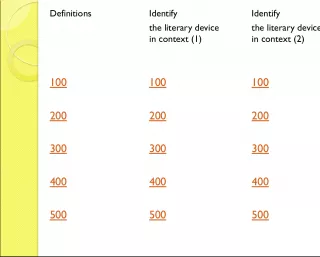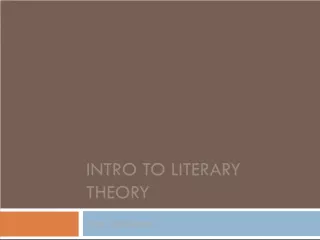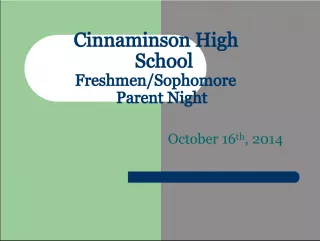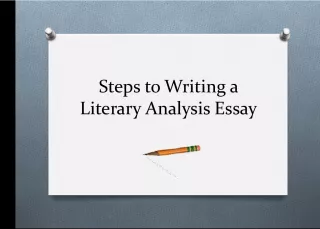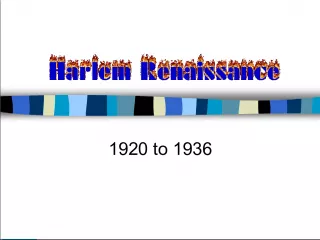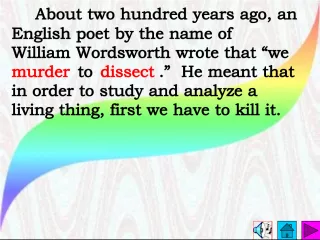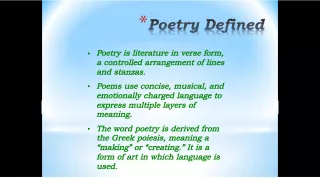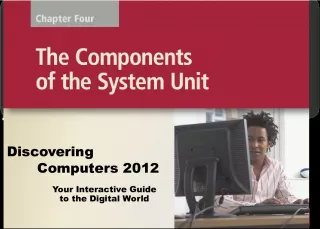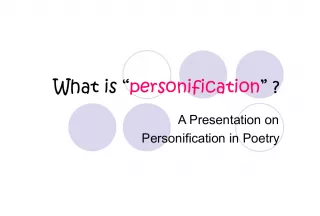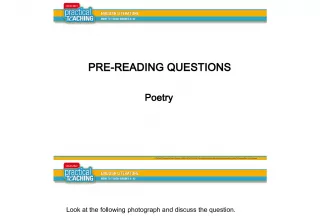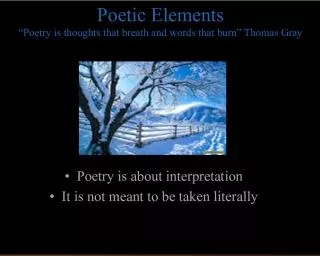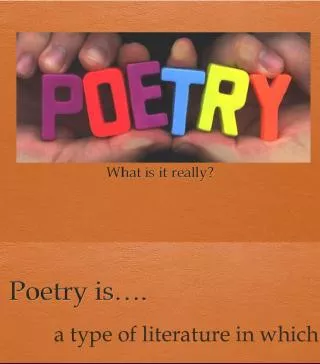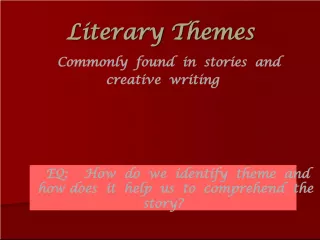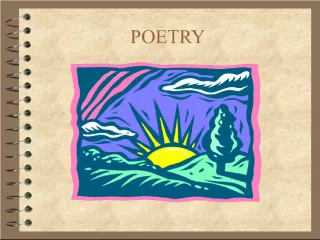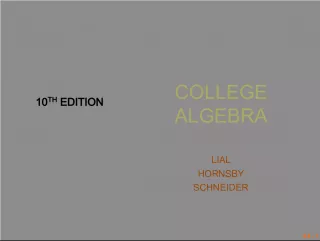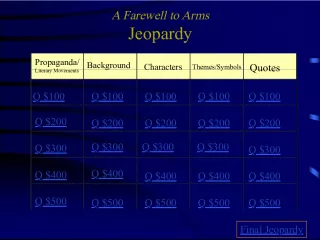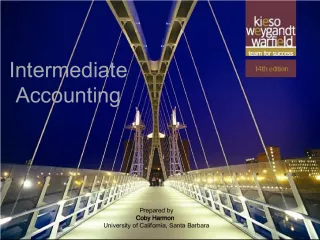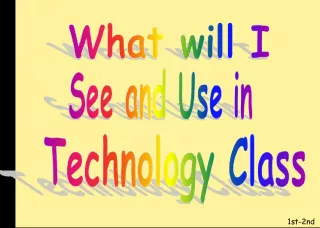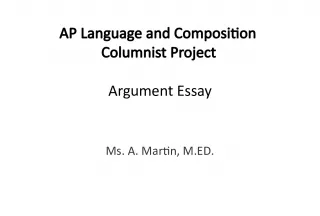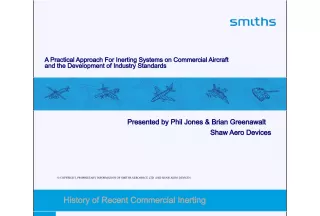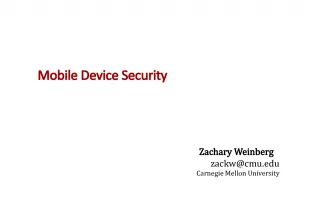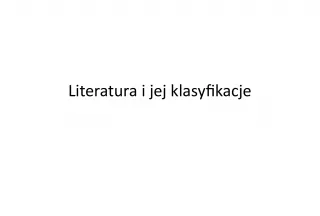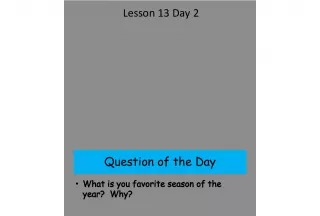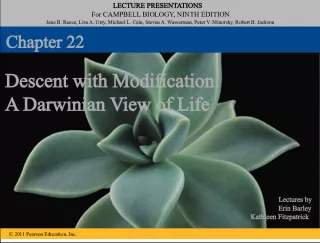Literary Devices Used in Poetry - Freshmen Edition
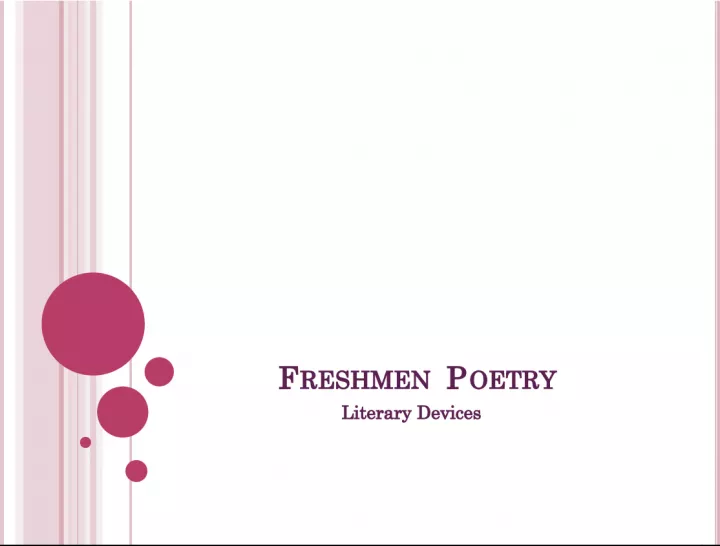

Learn about analogies which draw comparisons between two or more similar yet different things, and alliteration which involves repetition of initial consonant sounds.
- Uploaded on | 1 Views
-
 jimmysanders
jimmysanders
About Literary Devices Used in Poetry - Freshmen Edition
PowerPoint presentation about 'Literary Devices Used in Poetry - Freshmen Edition'. This presentation describes the topic on Learn about analogies which draw comparisons between two or more similar yet different things, and alliteration which involves repetition of initial consonant sounds.. The key topics included in this slideshow are . Download this presentation absolutely free.
Presentation Transcript
Slide1FRESHMEN P OETRY Literary Devices
Slide2ANALOGY
Slide3Makes a comparison between two orMore things that are similar in some ways but otherwise unlike.
Slide4Hot is to cold as fire is to ice.
Slide5ALLITERATION
Slide6The repetition of initial consonantsounds.
Slide7DANCING D OLPHINS B Y P AUL M C C ANN Those tidal thoroughbreds that tango through the turquoise tide. Their taut tails thrashing they twist in tribute to the titans. They twirl through the trek tumbling towards the tide . Throwing themselves towards those theatrical thespians
Slide8ALLUSION
Slide9A reference to a well-known person,place, event, literary work, or work of art.
Slide10ROMEO AND J ULIET B Y : W ILLIAM S HAKESPEARE “At lovers’ perjuries/they say Jove laughs”
Slide11ASSONANCE
Slide12The repetition of vowel soundsfollowed by different consonants in two or more stressed syllables.
Slide13WEST B EAST E AST B EAST Upon an island hard to reach, The East Beast sits upon his beach. Upon the west beach sits the West Beast. Each beach beast thinks he’s the best beast. Which beast is best?…Well, I thought at first That the East was best and the West was worst. Then I looked again from the west to the east And I liked the beast on the east beach least.
Slide14BLANK V ERSE
Slide15Poetry written in unrhymed iambicpentameter lines.
Slide16EXCERPT FROM M ACBETH BY A N E XCERPT FROM M ACBETH B Y : W ILLIAM S HAKESPEARE Tomorrow, and tomorrow, and tomorrow, Creeps in this petty pace from day to day, To the last syllable of recorded time; And all our yesterdays have lighted fools The way to dusty death. Out, out, brief candle! Life's but a walking shadow, a poor player That struts and frets his hour upon the stage And then is heard no more: it is a tale Told by an idiot, full of sound and fury, Signifying nothing
Slide17CONNOTATION
Slide18The set of ideas associated with aword in addition to its explicit meaning.
Slide19Lake: A vacation spot
Slide20COUPLET
Slide21A pair of rhyming lines, usually of thesame length and meter.
Slide22“HUSH LITTLE BABY , DON ' T SAY A WORD ," Hush little baby, don't say a word, Papa's gonna buy you a mockingbird. And if that mockingbird won't sing, Papa's gonna buy you a diamond ring. And if that diamond ring turns to brass, Papa's gonna buy you a looking glass. And if that looking glass gets broke, Papa's gonna buy you a billy goat. And if that billy goat won't pull, Papa's gonna buy you a cart and bull. And if that cart and bull turn over, Papa's gonna buy you a dog named Rover. And if that dog named Rover won't bark, Papa's gonna buy you a horse and cart. And if that horse and cart fall down, You'll still be the sweetest little baby in town!
Slide23DENOTATION
Slide24A words dictionary meaning,independent of other associations that the word may have.
Slide25Lake: A body of water
Slide26FREE V ERSE
Slide27Poetry that is not written in a regularrhythmical pattern, or meter. Seeks to capture the rhythms of speech.
Slide28TEENAGERS BY : A LEXANDRA L AVERN N EUSEN Surrounded by temptation persuasion from your peers actions done on impulse the thoughts of distant years anger for no reason and rage for silly things feelings always flowing too many now to seize yelling in frustration at those who've done no wrong restless and relentless just some wonderful teenage fun
Slide29HYPERBOLE
Slide30A deliberate exaggeration oroverstatement.
Slide31My heart broke in to a thousandpieces.
Slide32IMAGERY
Slide33A descriptive or figurative languageused in literature to create word pictures for the reader. Created by details of sight, sound, taste, touch, smell, or movement.
Slide34WORD W AR BY : B EVERLY A. M C C OLLEY Far into the night I wrestled with words, thrashing adjectives, stabbing adverbs, and piling dead participles.
Slide35IRONY
Slide36A general term for literary techniquesthat portray differences between appearance and reality, or expectation and result.
Slide37 Water, water, every where, And all the boards did shrink; Water, water, every where, Nor any drop to drink
Slide38METAPHOR
Slide39A figure of speech in which one thingis spoken of as though it were something else.
Slide40Jim is a horse.
Slide41ONOMATOPOEIA
Slide42The use of words that imitate sounds.
Slide43Buzz Plop Splash
Slide44PERSONIFICATION
Slide45A type of figurative language in whicha nonhuman subject is given human characteristics.
Slide46The wind danced through my hair.
Slide47RHYME I NTERNAL E ND R HYME S CHEME
Slide48The repetition of sounds at the ends ofwords. Occurs when the rhyming words appear in the same line. Occurs when the rhyming words come at the end of lines. A regular pattern of rhyming words in a poem.
Slide49Once upon a midnight dreary, while I pondered,weak and weary, (Edgar Allan Poe) Swans sing before they die—’twere no bad thing Should certain persons die before they sing (Samuel Taylor Coleridge) Bid me to weep, and I will weep While I have eyes to see ; And having none, and yet I will keep A heart to weep for thee . (Robert Herrick)
Slide50SYMBOL
Slide51Anything that stands for or representssomething else. An object that serves as a symbol has its own meaning, but also represents abstract ideas.
Slide52THE R OAD N OT T AKEN BY : R OBERT F ROST Two roads diverged in a yellow wood, And sorry I could not travel both And be one traveler, long I stood And looked down one as far as I could To where it bent in the undergrowth; Then took the other, as just as fair, And having perhaps the better claim, Because it was grassy and wanted wear; Though as for that the passing there Had worn them really about the same, And both that morning equally lay In leaves no step had trodden black. Oh, I kept the first for another day! Yet knowing how way leads on to way, I doubted if I should ever come back. I shall be telling this with a sigh Somewhere ages and ages hence: Two roads diverged in a wood, and I-- I took the one less traveled by, And that has made all the difference.
